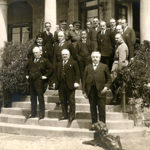Published March 7, 1992
Toward a More Humane Society: Practical Perspectives on the Social Thought of John Paul II. Conference at George Washington University
My task is to serve as a springboard for discussion of the economic thought of John Paul II. Even apart from the fact that many people in this room are more qualified than I am, this is a lot to accomplish in 20 minutes. I plan only to touch on some broad themes, letting the Pope speak for himself as much as possible, and close by asking briefly how we might apply the ideas in our daily lives.
Pope John Paul II sees his own contribution as a “renewal” — that is, both a continuation and an updating — of the Church’s modern social thought [Sollicitudo Rei Socialis (SRS), NC Documentary Service, March 3, 1988, 643]. I think his main contributions are, first, a concise reformulation of the Church’s method of analysing social and economic questions, often with the satisfying feel of a well-driven nail; and second, a quickness and surefootedness in taking account of new developments, not only in economic and social conditions, but also in secular economic and social theory.
Historical context. It may seem that encyclicals on economics are abstract, but in fact they are always tied to an analysis of some concrete historical event. The first encyclical of the Church’s modern social thought, in 1891, was called Rerum Novarum — literally, “of new things.” In it, Pope Leo XIII dealt with the social and political problems raised by industrialization. While affirming the right of private property, and predicting the failure of communism, he insisted on the dignity and rights of workers and the need to protect the weakest, by government intervention if necessary. Several subsequent encyclicals further developed and applied this analysis as conditions changed.
In the 1960s, after the decolonization of much of Africa, Asia and Central and South America following the Second World War, the horizons of the Church’s social thought widened to embrace the emerging so-called “Third World.” Moved by the poverty he witnessed on his travels, Pope Paul VI argued in Populorum Progressio (“The Development of Peoples”) that “the social question has become worldwide.”
Leaving aside Laborem Exercens, his encyclical on the dignity and vocation of work, as proper to one of our other panels, Pope John Paul II has published two major encyclicals on economic matters. Both began by looking back at an earlier papal encyclical. Sollicitudo Rei Socialis (“The Church’s Social Concern”) was published on the 20th anniversary of Populorum Progressio, and was intended to fill “the need for a fuller and more nuanced concept of development” than had previously been put forward. In it, he argued that the terms “poverty” and “development” mean poverty or development of the whole person, not just the economic or political system.
Centesimus Annus, as the title indicates, was issued last year on the 100th anniversary of Rerum Novarum. In it, the pope looks back at what remains valid in the social thought begun in that encyclical, but also takes note of the “new things” which have emerged, such as changes in the nature of Western economies and the collapse of communism. Its particular merit is to bring both strains of the Church’s social thought into a single unified framework.
The flatworm problem. In discussing any encyclical — much less the economic thought of the pope or the Church — we immediately run into a problem. This problem is a symptom of the whole reason why the pope writes about economics in the first place — and why, whatever he writes, it will be widely misunderstood.
The best way I can describe this problem is to borrow an analogy from a physicist, Sir James Jean. Imagine a race of blind worms, limited to the two-dimensional surface of the earth. Such “flatworms” would be unable to explain a rainshower. All they would know is that, now and then, spots of the earth would become wet without any apparent pattern. We, who live in three dimensions, know that the pattern is uniquely determined by events which occur in all three dimensions. But “the worms, unconscious even of the existence of the third dimension…would only be able to discuss the wetness or dryness of minute areas in terms of probabilities, which they would be tempted to treat as ultimate truth” [The Mysterious Universe, 1930, 148].
This parable has been used to explain how we can reconcile modern physics with belief in divine providence. But it’s also a pretty good description of what happens every time the Pope opens his mouth on the subject of economics. Our first impulse is to reduce the latest encyclical to the terms of the current political debate and ask, Whose side is he on? In fact, economics and politics are usually discussed in one dimension — along a single line from Left to Right. Each papal pronouncement is immediately pounced upon to examine where it falls along this continuum.
Invariably, some people wind up quoting selectively to show that the latest encyclical supports their position. For example, Centesimus Annus [(CA) St. Paul Books and Media, 1991] can be quoted to point out that the Church defends the right to private property, the importance of free markets, the legitimacy of self-interest and profit, the importance of saving and investment, the dangers of a bloated welfare state and excessive government spending, and affirms the impossibility of a compromise between Christianity and Marxism.
On the other hand, equally selective quotation could point out that the Pope repeatedly emphasizes the role of trade unions, the Church’s “preferential option for the poor,” the need for government assistance programs and intervention, that he criticizes “structures of sin” in East and West, “consumerism” and “alienation” in Western society; that he applies to the Third World Pope Leo XIII’s phrase about poverty which is a “yoke little better than slavery itself”; calls for an increased role for the U.N., and “above all a change of lifestyles, of models of production and consumption, and of the established structures of power which today govern societies” [CA, 80].
Some people have thrown up their hands and concluded that the Church is all over the lot. For example, some argued that, in Sollicitudo Rei Socialis, the Pope was preaching the “moral equivalence” of Western democracies and communist dictatorships.
Over the past century, many other well-intentioned but misguided people have concluded that the Church plants itself squarely between extremes and advocates a “third way” — either some hybrid or else a uniquely Catholic brand of economics.
The problem with each of these interpretations is that they try to cram the Church’s social thought into a single dimension, when the whole point of the social doctrine is to insist that economic and political issues always have a moral and spiritual dimension.
In fact, Pope John Paul II has emphasized that “the church does not propose economic and political systems or programs nor does she show preference for one or the other, provided that human dignity is properly respected…. The Church’s social doctrine is not a ‘third way’ between liberal capitalism and Marxist collectivism nor even a possible alternative to other solutions less radically opposed to one another: Rather, it constitutes a category of its own” [SRS, 655].
What is the Pope saying? If I had to pick the three most important themes associated with John Paul II’s economic thought, they would be, first, “the person,” second, “solidarity,” and third, “true freedom.”
The person. The “sole purpose” of the Church’s social thought, the Pope wrote in Centesimus Annus, “has been the care and responsibility for the human person…. This, and this alone, is the principle which inspires the Church’s social doctrine” [CA, 75-6].
The human person is the only creature willed for his own sake, created in God’s image and likeness, whose end is God. From this dignity proceed fundamental rig
hts and responsibilities, including certain rights in the economic sphere, such as the right to work to support one’s family, the right of economic initiative, the right to a just or living wage and the right to private property.
The essential difference between an “individual” and a “person” is the fact of relation to others. “According to Rerum Novarum and the whole social doctrine of the Church,” the Pope rights, “the social nature of man is not completely fulfilled in the state, but is realized in various intermediary groups, beginning with the family and including economic, political and cultural groups which stem from human nature itself and have their own autonomy, always with a view to the common good. This is what I have called the ‘subjectivity’ of society…” [CA, 21]. “It is in interrelationships on many levels that a person lives, and that society becomes ‘personalized'” [CA, 70].
Because they “stem from human nature itself,” the right to form groups like the family, trade unions, businesses, and charitable organizations is also fundamental and precedes the State.
Solidarity. Another important theme for John Paul II is “solidarity,” which he has repeatedly emphasized, particularly in Sollicitudo Rei Socialis. Solidarity is the virtue of steadfast commitment to the good of others, based on recognizing their dignity and our interdependence. The pope considers it complementary to subsidiarity. He put the relation between the two succinctly in an “Instruction on Christian Freedom and Liberation”:
“Intimately linked to the foundation, which is man’s dignity, are the principle of solidarity and the principle of subsidiarity.
“By virtue of the first [solidarity], man with his brothers is obliged to contribute to the common good of society at all levels. Hence the Church is opposed to all forms of political individualism.
“By virtue of the second [subsidiarity], neither the State nor any society must ever substitute itself for the initiative and responsibility of individuals and intermediate communities at the level on which they can function, nor must they take away the room necessary for their freedom. Hence the Church is opposed to all forms of collectivism” [Vatican Polyglot Press, 1986, sec. 73].
The government’s proper role is supposed to be “subsidiary” or “helping” to the more primary groups. But it does so in two ways: indirectly, by creating conditions in which those groups can prosper; and directly, through taxation, spending, regulation and other means.
Moral equivalence? A great deal of confusion has arisen over the years concerning the Church’s parallel criticism of individualism and collectivism. In its broadest sense, the criticism boils down to this: “The individual today is often suffocated between two poles represented by the State and the marketplace. At times it seems as though he exists only as a producer and consumer of goods, or as an object of state administration. People lose sight of the fact that life in society has neither the market nor the State as its final purpose, since life itself has a unique value which the State and the market must serve” [CA, 70-71].
The result is to empty the human person of his dignity. People are treated as means rather than ends, while the pursuit of power or profit becomes the end rather than means of human existence. The extremes would be Marxism or social Darwinism, but the tendency can be found even in the most favorable economic or political system.
“If we then inquire as to the source of this mistaken concept of the nature of the person and the ‘subjectivity’ of society,” the Pope says, “we must reply that its first cause is atheism” [CA 21]. At first glance, this is a surprising statement, coming in the middle of a discussion about economic and political systems. But when you think about it, any ideology which argues that either the State or the market should have no limits must start from the premise that man has no inherent dignity as a creature of God, beyond his political or economic function.
When he criticizes individualism or consumerism, the Pope explains in Centesimus Annus, “These criticisms are directed not so much against an economic system as against an ethical and cultural system. The economy in fact is only one aspect and one dimension of the whole of human activity. If economic life is absolutized, if the production and consumption of goods become the center of social life and society’s only value, not subject to any other value, the reason is to be found not so much in the economic system itself as in the fact that the entire socio-cultural system, by ignoring the ethical and religious dimension, has been weakened, and ends by limiting itself to the production of goods and services alone” [CA, 56-57].
In the same encyclical, the Pope clears up any misunderstanding by posing the question: “Can it perhaps be said that, after the failure of Communism, capitalism is the victorious social system, and that capitalism should be the goal of the countries now making efforts to rebuild their economy and society? Is this the model which ought to be proposed to the countries of the Third World which are searching for the path to true economic and civil progress?”
“The answer is obviously complex,” he continues. “If by ‘capitalism’ is meant an economic system which recognizes the fundamental and positive role of business, the market, private property and the resulting responsibility for the means of production, as well as free human creativity in the economic sector, then the answer is certainly in the affirmative, even though it would perhaps be more appropriate to speak of a ‘business economy,’ ‘market economy,’ or simply ‘free economy.’ But if by ‘capitalism’ is meant a system in which freedom in the economic sector is not circumscribed within a strong juridical framework which places it at the service of human freedom in its totality and sees it as a particular aspect of that freedom, the core of which is ethical and religious, then the reply is certainly negative” [60].
New things in economics. The Pope’s heavy emphasis on the human person has a parallel in recent economic theory, which recognizes that the economic success of a nation or a business today is determined not so much by mere physical quantities of natural resources, labor and capital, as by the technology, knowhow and skill of its people, sensitivity to the needs of employees and customers’ demands for quality, openness to new opportunities, and prevailing institutions and culture.
“Even in recent years it was thought that the poorest countries would develop by isolating themselves from the world market and by depending only on their own resources,” the Pope notes. “Recent experience has shown that countries which did this have suffered stagnation or recession, while the countries which experienced development were those which succeeded in taking part in the general interrelated activities at the international level. It seems therefore that the chief problem is that of gaining fair access to the international market, based not on the unilateral principle of the exploitation of the natural resources of those countries but on the proper use of human resources.” [CA, 48].
True freedom. A final theme of the Pope’s, especially concerning the United States, is his insistence on the connection between freedom and truth. On his two trips to this country, the Pope praised the “ordered freedom” of America’s institutions as conceived by the Founders — based on the idea that people are endowed by their Creator with certain inalienable rights.
But he warned against slipping into what he called a “practical atheism.” “In our own day,” he asked, “are we not perhaps witnesses of the fact that often in rich societies, where there is an abundance of material well-being, permissiveness and moral relativism find easy acceptance? And where the moral order is undermined, God is
forgotten and questions of ultimate responsibility are set aside. In such situations a practical atheism pervades public and private living” [Homily at Monterey, Sept. 17, 1987].
“The only true freedom, the only freedom that can truly satisfy, is the freedom to do what we ought as human beings created by God according to his plan” [Address to President and Mrs. Reagan, Viscaya, September 10, 1987]. In a sense, he argues that the only true freedom is the freedom to serve others. He specifically mentioned, among others, the poor, homeless, jobless, refugees, migrants, minorities, women, the old, sick or handicapped, and “especially the weakest and most defenseless ones, those as yet unborn” [Farewell in Detroit, September 19, 1987].
The temptation for the United States as a nation, according to the Pope, is “to close in on yourselves, to enjoy the fruits of your own progress and to try to forget about the rest of the world” [Address on Social Justice Issues, Detroit, Sept. 19, 1987]. He suggested that the U.S. role would consist not only of traditional direct efforts like feeding the hungry, but especially “establishing a world order that will create the necessary economic and trade conditions for a more just relationship between all the nations of the world” [Address to President and Mrs. Reagan, Viscaya, September 10, 1987].
How can we apply the ideas? Rather than a party platform, the Church offers a way of thinking about social and economic problems. It does not relieve us of the responsibility of learning disciplines like economics or politics. “The Church has no models to present,” according to the Pope [CA, 61]. “The pre-eminent role…belongs to the laity,” he says, “by the way they live as individuals and as families, by the use of their resources, by their civic activity, by contributing to economic and political decisions and by personal commitment to national and international understandings” [SRS, 657-8].
For those of us who, now and again, have the chance to influence public policy, applying these insights does not involve an unwarranted injection of religion into politics — just as it is no mixing of Church and State to pass laws against stealing and murder, despite the fact that these are forbidden by the Ten Commandments.
And even if your field is not economics, it’s important to appreciate the interconnection of economic and social problems. To take just one example, I’m amazed that no one has drawn the connection between slower growth of the labor force and employment since 1989 and the legalization of abortion about 19 years earlier. (New York and other states legalized abortion in 1970, and Roe vs. Wade followed three years later.) Obviously, there are many other factors at work, too. But it’s equally clear that when we as a nation prevent up to 1-1/2 millions births a year, then 16 to 19 years later the labor force — as well as the number of consumers, savers and investors — will be that much smaller. To date, legalized abortion has guaranteed that our economy will be about 10 percent smaller than otherwise. This is not significant for deciding the question, but the outcome has a large cumulative effect on the economy.
Not all of us are routinely in the position to directly influence public policy, apart from voting and paying our taxes. So rather than push my own favorite policies here in election season, I will conclude by inquiring how an individual — one of us — could try to put these ideas into effect in our daily lives. I think we can get some hints by considering our relationship with others through the basic economic and social groups we mentioned earlier.
The first question we might ask ourselves, though it may seem strange, is whether we enjoy the things we own. The whole idea of property in the Church’s teaching is not just to pay the bills but to create a sphere of personal freedom. G.K. Chesterton once said that a person’s relation to his home or garden should be like an artist’s to his canvas. The paradox is that we spend so much effort acquiring things, which then become invisible to us because we don’t appreciate or take care of them.
Second, do we make choices which threaten our responsibility to support our family or even to make ourselves a burden on others? When a Michael Milken takes over a business with no money down, and expects to get bailed out by rising prices, we call it a leveraged buyout. When you or I buy a house on the same principle, it’s called the American Dream. The state of the economy is beyond our personal control, but at least most of the time, our personal finances are not.
The next level of meeting needs comes from charitable efforts. Government programs are sometimes necessary, but their great disadvantage is that, because they must treat everyone the same, they are impersonal. There’s no subsitute for knowing the person you want to help. Most of us have many opportunities to do just that: volunteering to help someone learn to read, make sandwiches or serve in a soup kitchen, be a phone volunteer for a senior citizens outreach program, take meals to the shut-in or blankets to the homeless, visit those in prison, and so on.
Even when this is hard to do — for example, for parents of small children — we can contribute our money. What about setting a goal of tithing? On average, Americans contribute about 2-1/2 percent to charitable organizations. Tithing would quadruple that, and the money would often be more efficiently used than if the same problems had to be solved by the government. A frequent rule of thumb is to give half of it to your church and the other half to various charitable organizations at home and abroad.
Finally, some of us have at least a partial role in running a business or other association. A business needs to turn a profit, or else it goes out of business. But it is also “a community of persons” who are trying to satisfy their basic needs by performing some service for others [CA, 50]. It is often possible to structure ownership, profit-sharing, or at least decisionmaking so that people can feel they have a full share in that community.
I’m sure we can come up with many more suggestions, and each of the points deserves a much fuller treatment than I have been able to give, but I hope this serves at least as a starting point for our discussion.












